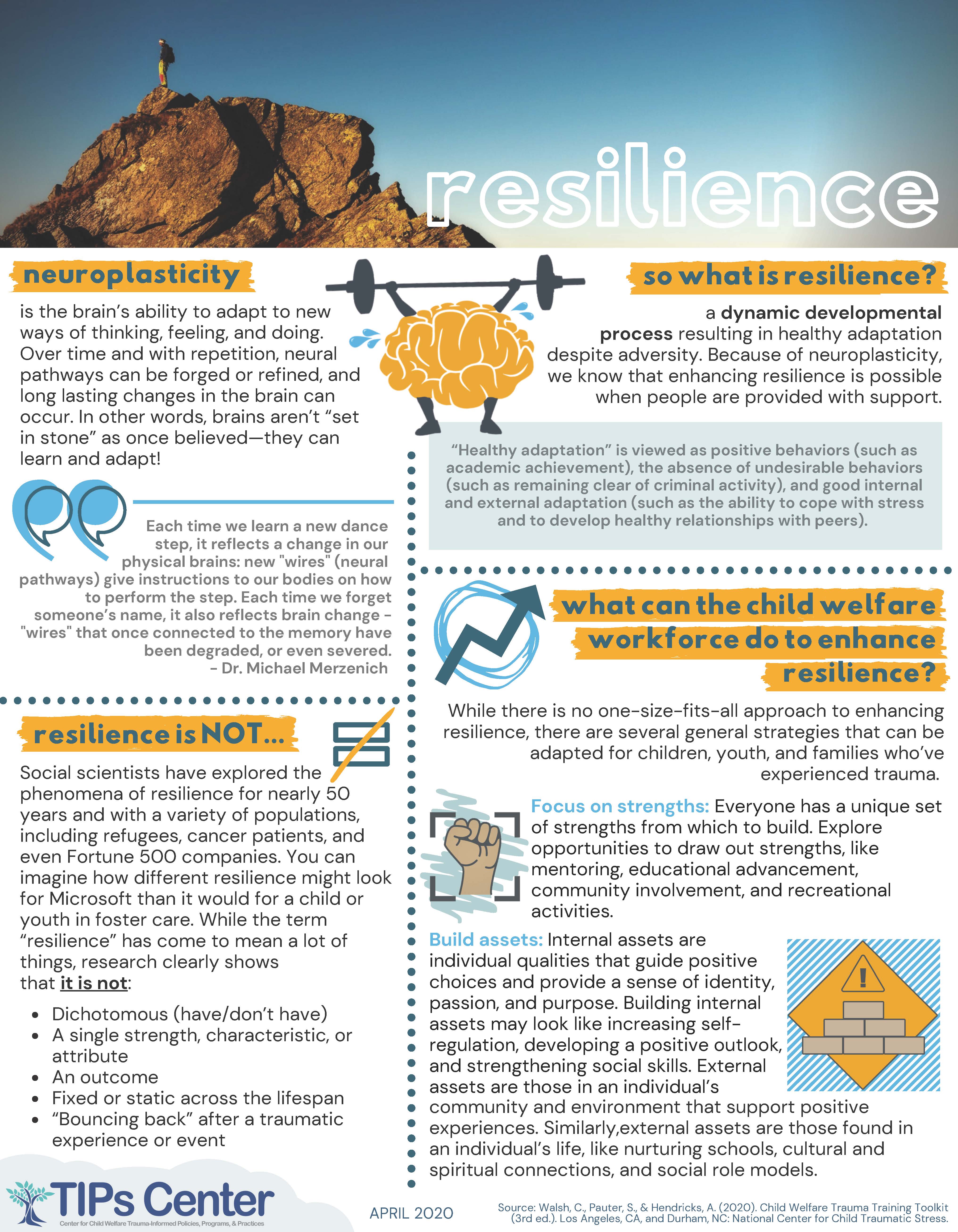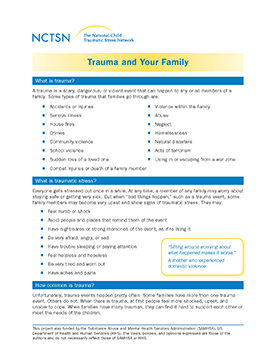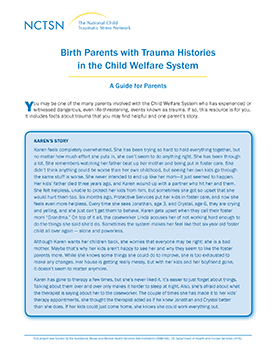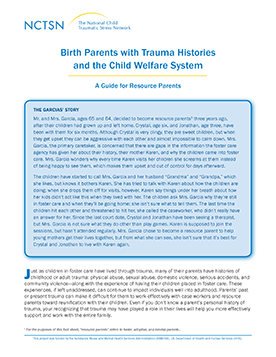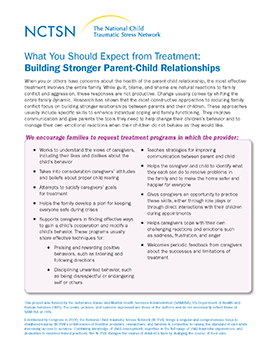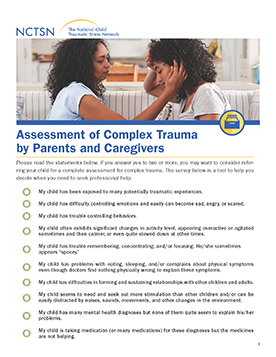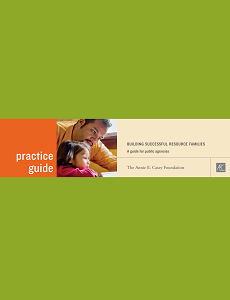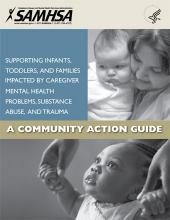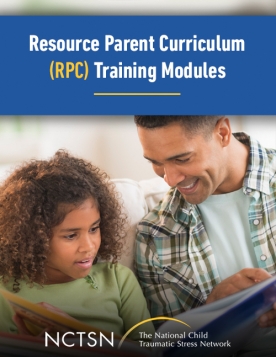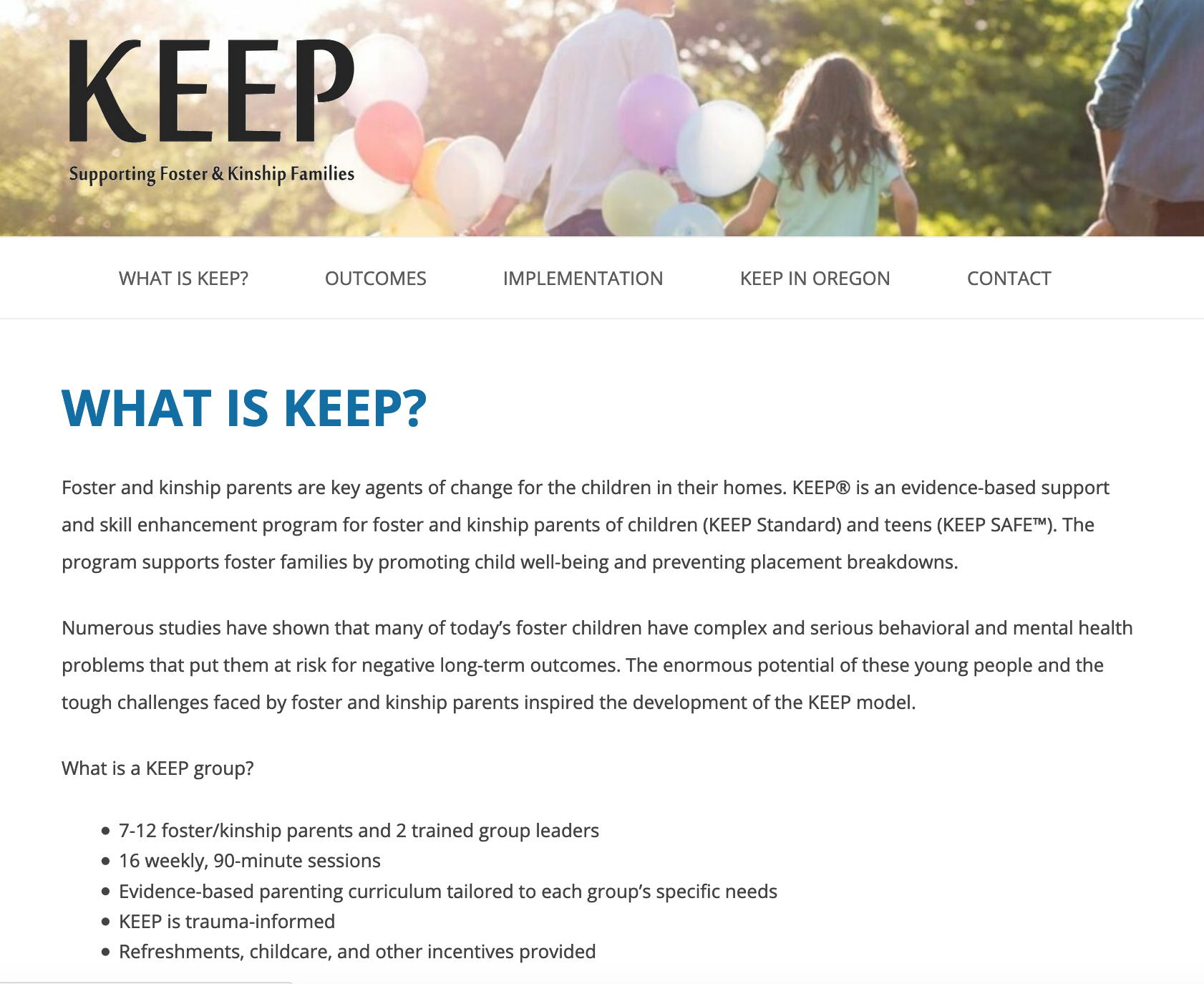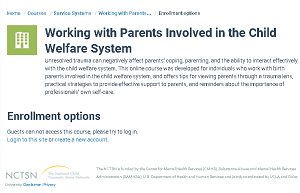-
Resilience
Family & Caregiver Trauma, Well-Being, & Resilience
TIPs CenterGeneralThis infographic expands on the conceptualization of resilience as presented in the Child Welfare Trauma Training Toolkit (3rd ed.). It reviews topics on neurplasticity, common misconeptions about resilience, and strategies that the child welfare workforce can employ to enhance resilience of children, youth, and families.
-
Trauma and Your Family
Family & Caregiver Trauma, Well-Being, & Resilience
National Child Traumatic Stress Network (NCTSN)CaregiversThis fact sheet offers parents and caregivers information about trauma, defines traumatic stress, describes how common it is, how it can impact a family, and things a family can do to cope with traumatic stress.
-
Birth Parents with Trauma Histories in the Child Welfare System: A Guide for Parents
Family & Caregiver Trauma, Well-Being, & Resilience
National Child Traumatic Stress Network (NCTSN)CaregiversThis fact sheet highlights the importance of birth parents understanding the serious consequences their trauma histories can have on them and the subsequent potential impact on their parenting.
-
Birth Parents with Trauma Histories and the Child Welfare System: A Guide for Resource Parents
Family & Caregiver Trauma, Well-Being, & Resilience
National Child Traumatic Stress Network (NCTSN)CaregiversThis fact sheet provides suggestions that resource parents can use to recognize how trauma may have impacted the way birth parents parent. This fact sheet helps resource parents to more effectively support and work with a foster child's birth parent(s).
-
Getting Help After a Trauma: Is My Family Ready?
Family & Caregiver Trauma, Well-Being, & Resilience
University of MinnesotaCaregiversThis worksheet is designed for families to assist them in making decisions about their readiness to start trauma counseling.
-
What You Should Expect from Treatment: Building Stronger Parent-Child Relationships
Family & Caregiver Trauma, Well-Being, & Resilience
National Child Traumatic Stress NetworkCaregiversThis tip sheet provides information about what parents can expect from treatment.
-
Finding a Therapist for Evidence Based Treatment
Family & Caregiver Trauma, Well-Being, & Resilience
UW Medicine Harborview Medical CenterCaregiversThis handout is intended for individuals and family members looking for evidence-based treatments. While it is intended for adults, the handout provides helpful questions caregivers can ask therapists when looking for evidence-based treatment.
-
Assessment of Complex Trauma by Parents and Caregivers
Family & Caregiver Trauma, Well-Being, & Resilience
National Child Traumatic Stress Network (NCTSN)CaregiversThis fact sheet provides suggestions that resource parents can use to recognize how trauma may have impacted the way birth parents parent. This fact sheet helps resource parents to more effectively support and work with a foster child's birth parent(s).
-
Supporting, Retaining & Recruiting Resource Families
Family & Caregiver Trauma, Well-Being, & Resilience
Public Child Welfare Training AcademyChild WelfareThis research summary outlines evidence-based practices around support models for resource families, best practices for developing retention programs, and promising practices around recruitment.
-
Trauma-Informed Parenting: Supplemental Resources
Family & Caregiver Trauma, Well-Being, & Resilience
National Child Traumatic Stress Network (NCTSN)CaregiversThis document offered through the Learning Center of the NCTSN brings together concise tip sheets for parents on trauma-informed parenting. Accessing this resource requires a free registration at https://learn.nctsn.org/. Once you have a registration and are signed on you can either use the link on this page or search the name of the resource on the NCTSN Learning Center website to access this resource.
-
Building Successful Resource Families – Practice Guide
Family & Caregiver Trauma, Well-Being, & Resilience
The Annie E. Casey FoundationChild WelfareThis practice guide outlines the importance, challenges, and best practices in working and supporting resource families
-
Supporting Infants, Toddlers, and Families Impacted By Caregiver Mental Health
Family & Caregiver Trauma, Well-Being, & Resilience
Substance Abuse and Mental Health Services Administration (SAMHSA)GeneralThis action guide discusses the importance of early development and ways to build and foster resilience among young children through a community approach. The guide provides a six-step road map for implementing changes within your community.
-
Building Successful Resource Families – Practice Guide
Family & Caregiver Trauma, Well-Being, & Resilience
The Annie E. Casey FoundationChild WelfareThis practice guide outlines the importance, challenges, and best practices in working and supporting resource families
-
Supporting Infants, Toddlers, and Families Impacted By Caregiver Mental Health
Family & Caregiver Trauma, Well-Being, & Resilience
Substance Abuse and Mental Health Services Administration (SAMHSA)GeneralThis action guide discusses the importance of early development and ways to build and foster resilience among young children through a community approach. The guide provides a six-step road map for implementing changes within your community.
-
TST-FC: A Trauma-Focused Curriculum for Caregivers
Family & Caregiver Trauma, Well-Being, & Resilience
The Annie E Casey FoundationCaregiversTrauma Systems Therapy for Foster Care (TST-FC) is a powerful new training curriculum designed to enhance foster parents’ understanding of how trauma affects children’s behavior
-
Resource Parent Curriculum (RPC) Online Course
Family & Caregiver Trauma, Well-Being, & Resilience
National Child Traumatic Stress Network (NCTSN)Child WelfareThis online course offered through the Learning Center of the NCTSN is a source that acts as a precursor for the “Caring for Children Who Have Experienced Trauma: A Workshop for Resource Parents”, to aide resource families in deciding whether the workshop is beneficial to their needs. Face-to-face modules are available to reinforce learning and present to the child’s service team.
-
Empowering Families Through Evidence-Based Interventions 2: Family and Community Strategies
Family & Caregiver Trauma, Well-Being, & Resilience
National Child Traumatic Stress Network (NCTSN)CaregiversThis webinar offers practical information about two family interventions commonly delivered for families who are at risk for or who have experienced physical abuse (CPC-CBT and MST-CAN).
-
KEEP
Family & Caregiver Trauma, Well-Being, & Resilience
KEEPChild WelfareKEEP is an evidence-based support and skill enhancement education program for foster and kinship parents of children’s and adolescents. The goal of KEEP is to reduce placement breakdowns by offering training on research-based parenting techniques.
-
Working with parents involved in the child welfare system
Family & Caregiver Trauma, Well-Being, & Resilience
National Child Traumatic Stress Network (NCTSN)Child WelfareThis online course offered through the Learning Center of the NCTSN was developed for individuals who work with birth parents involved in the child welfare system. It offers tips for viewing parents through a trauma lens and practical strategies to provide effective support to parents. Accessing this resource requires a free registration at https://learn.nctsn.org/. Once you have a registration and are signed on you can either use the link on this page or search the name of the resource on the NCTSN Learning Center website to access this resource.
-
TST-FC: A Trauma-Focused Curriculum for Caregivers
Family & Caregiver Trauma, Well-Being, & Resilience
The Annie E Casey FoundationCaregiversTrauma Systems Therapy for Foster Care (TST-FC) is a powerful new training curriculum designed to enhance foster parents’ understanding of how trauma affects children’s behavior
-
Resource Parent Curriculum (RPC) Online Course
Family & Caregiver Trauma, Well-Being, & Resilience
National Child Traumatic Stress Network (NCTSN)Child WelfareThis online course offered through the Learning Center of the NCTSN is a source that acts as a precursor for the “Caring for Children Who Have Experienced Trauma: A Workshop for Resource Parents”, to aide resource families in deciding whether the workshop is beneficial to their needs. Face-to-face modules are available to reinforce learning and present to the child’s service team.
-
Empowering Families Through Evidence-Based Interventions 2: Family and Community Strategies
Family & Caregiver Trauma, Well-Being, & Resilience
National Child Traumatic Stress Network (NCTSN)CaregiversThis webinar offers practical information about two family interventions commonly delivered for families who are at risk for or who have experienced physical abuse (CPC-CBT and MST-CAN).
-
KEEP
Family & Caregiver Trauma, Well-Being, & Resilience
KEEPChild WelfareKEEP is an evidence-based support and skill enhancement education program for foster and kinship parents of children’s and adolescents. The goal of KEEP is to reduce placement breakdowns by offering training on research-based parenting techniques.
-
Working with parents involved in the child welfare system
Family & Caregiver Trauma, Well-Being, & Resilience
National Child Traumatic Stress Network (NCTSN)Child WelfareThis online course offered through the Learning Center of the NCTSN was developed for individuals who work with birth parents involved in the child welfare system. It offers tips for viewing parents through a trauma lens and practical strategies to provide effective support to parents. Accessing this resource requires a free registration at https://learn.nctsn.org/. Once you have a registration and are signed on you can either use the link on this page or search the name of the resource on the NCTSN Learning Center website to access this resource.
